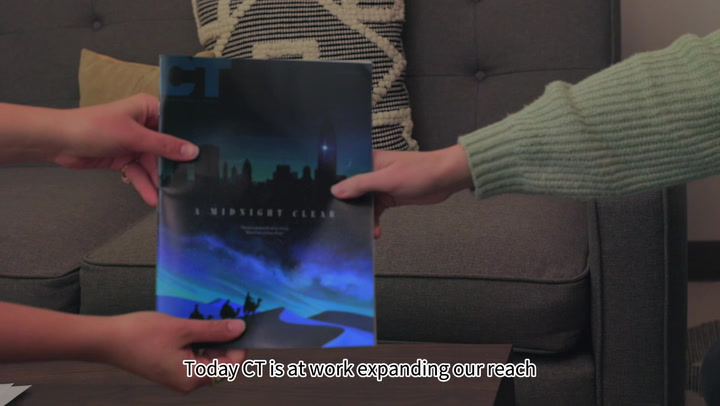
Will you help encourage and connect the church?
Give NowWill you help encourage and connect the church?
Give NowWhat if we made a magazine that aimed more at delighting readers than at convincing them? What if we used beautiful design and technology to create a distraction-free reading environment? Could we provide respite from the media noise? Could our magazine be an alternative to information overload? Could we encourage a sense of wonder? These are the questions that spurred Christianity Today editors Ted Olsen and Mark Galli to create The Behemoth, a bi-weekly digital magazine focusing on science and theology.
As this magazine's copy editor, I can say that we were thrilled when we read a review of The Behemoth in Medium. The author, Scott Fillmer, touched on many of these publishing principles we used to shape our magazine. I spoke with Fillmer about his take on The Behemoth, reading, and seeking wonder.
First of all, would you introduce yourself to our audience?
My name is Scott Fillmer. My wife and I live in the Auburn, Alabama area and have been married now for over 20 years. I somehow, graciously, managed to earn a BS in Accounting from the University of Alabama at Birmingham and an MA in Theology from Liberty University. I'm currently on staff at Cornerstone Church in Auburn, Alabama as the Business Administrator and Production Manager and have been honored to serve on staff there for almost 7 years.
You mentioned that our article on the physics of baseball caught your eye. A quick glance at your website makes it clear that you're a stats guy. What about this piece pulled you into the magazine?
I am a "stats guy" but only to the extent that I can see through the numbers and into the beauty and passion, the life, those numbers most assuredly must represent. I think early on in life we inadvertently tend to pick, focus, and live out, one or the other, as if we have to choose one side of the coin: I'm a numbers guy, therefore I can't see art; I'm an artist, so don't bother me with the numerical analysis.
Scripture is so crammed full of numbers that it even has a book named Numbers. Right from the creation story it is numeric, and yet who can argue it's also unequaled in beauty. Baseball is arguably the most stat-driven game ever played; a mathematician's dream of endless possibilities, yet baseball is also one of the most beautiful and poetic games ever played. Pick up any book by Roger Angell and you will discover words that transform numbers into art and stories about life.
When the editors wrote "Hitting a Major League Pitch," they showed beauty behind the numbers, and for me, I had actually found a publication that captured both sides of the coin. For the editors to combine my love for a seemingly simple childhood game, and my longtime love for our Creator, well that was just something that was going to find its way to me one way or the other.
So we roped you in with that piece, and you say you look forward to each issue. What stands out to you about The Behemoth?
Yes, you may have tugged at my heart with that piece, but it wasn't the first piece I read that day. I started from the "letter" out of curiosity and moved methodically forward. I would say we, the Western church, are currently living in the information age, and yet spiritually, it is a time of anti-intellectualism. A time some might define as skepticism towards the church, education, philosophy, literature, art, and science. With that, there are few choices in current periodicals for those who seek out both sides of the coin, and The Behemoth seemed to fit nicely into that niche.
I love the way you summed up The Behemoth: "You may not understand The Behemoth's orthodoxy because you are viewing art and poetry, not a theological exegesis or apologetic argument." Now, you were responding to Answers in Genesis. But you got at our vision. There's not a lot of space carved out in the Christian world for that. In short, for wonder, which is why we founded The Behemoth.
I think that actually points to our current spiritual landscape. Is this a cultural change, or the depth at which we the church have possibly failed in creating disciples who create disciples? We rarely seem to go deeper than surface level with anything anymore, but wonder and awe are only realized in the depths. We still want that deep understanding, but we want a way that takes less time, where we can multitask it. We want to learn the beauty behind Beethoven's concertos, but we can't possibly listen to a three-part, 30-minute single piece of work.
For me, The Behemoth taking on just the task of talking about wonder, the mystery, being awestruck over God, is so important for our time. We are on the cusp of making God's word only about the numbers and facts, completely missing its beauty. We are Peter at the transfiguration saying, "Hey, this is cool, hang on while I Instagram this and grab you guys a tent," missing the jaw-dropping beauty standing right in front of us. We are Martha, busy making dinner and doing the dishes while the actual Son of God sits in the other room, waiting for us to put down our distractions and just be in awe over the fact that we can actually fellowship with God.
You caught our vision for content as a means to wonder towards God here: "We reside in the age of information and usually think every single thing about every single topic should be a known. It is pretty amazing how the more we know, the more we realize how little we know about how much we actually do know." You're right: much Christian content seems to focus on bettering the reader. We're more interested in helping the reading get out of himself, to zoom out. How do you create wonder in your life and reading?
We certainly live in a self-help world. I think there is an overall expectation in almost all writing today to leave the reader with "next steps" in what to do, a step-by-step process. We rarely leave readers without final resolve to the well-placed climax about 85% of the way through the book, story, movie, or video. It's super easy to treat scripture as the ultimate self-help book, but that is what really attracted me to The Behemoth. Its lack of "do this" at the end of each article.
As hard as it is to do today, I try to purposely seek out time to create space for wonder. I guess in a word, I try to create margin, constantly. Learning to say no has been really hard for me, but vital. That often means focusing on fewer things, which allows me to then go deeper in just those few things. I'm a purposeful reader, who has had to learn to savor each word read instead of speed reading massive amounts of material. I am also sort of a psychotic journaler, writing somewhere around 1,000-2,000 words a day, which forces wonder, but requires time to develop.
What do you look for in a publication? What else do you read?
I look for something that is going to offer a unique point of view, something that is original, not something that is a rehash other publications, and something that will force me to think. I've moved to reading almost everything in a digital form at this point, which has opened up so many possibilities. Ask any seasoned photographer "What is the best camera?" and they will tell you, "The one you have with you." I can now carry limitless things to read, but have become very intentional about what I read. Beyond scripture, I usually pick one or two periodicals, and one or two books. Most of the time that consists of a book on baseball, a theological/spiritual book, and a biography. At this writing, those are Season Ticket by Roger Angell, Praying with Paul by D. A. Carson, and Things That Matter by Charles Krauthammer.
See Scott Fillmer's writing and photography on Twitter (@scottfillmer) or his website, scottfillmer.com. Andie Roeder Moody is assistant editor and marketer for The Behemoth and Christianity Today.








